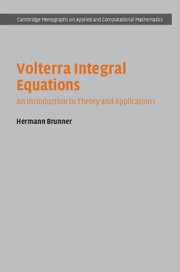Book contents
- Frontmatter
- Contents
- Preface
- 1 Linear Volterra Integral Equations
- 2 Regularity of Solutions
- 3 Non-Linear Volterra Integral Equations
- 4 Volterra Integral Equations with Highly Oscillatory Kernels
- 5 Singularly Perturbed and Integral-Algebraic Volterra Equations
- 6 Qualitative Theory of Volterra Integral Equations
- 7 Cordial Volterra Integral Equations
- 8 Volterra Integral Operators on Banach Spaces
- 9 Applications of Volterra Integral Equations
- Appendix A Review of Banach Space Tools
- References
- Index
Preface
Published online by Cambridge University Press: 02 February 2017
- Frontmatter
- Contents
- Preface
- 1 Linear Volterra Integral Equations
- 2 Regularity of Solutions
- 3 Non-Linear Volterra Integral Equations
- 4 Volterra Integral Equations with Highly Oscillatory Kernels
- 5 Singularly Perturbed and Integral-Algebraic Volterra Equations
- 6 Qualitative Theory of Volterra Integral Equations
- 7 Cordial Volterra Integral Equations
- 8 Volterra Integral Operators on Banach Spaces
- 9 Applications of Volterra Integral Equations
- Appendix A Review of Banach Space Tools
- References
- Index
Summary
This monograph presents an introduction to the theory of linear and non-linear Volterra integral equations, ranging from Volterra's fundamental contributions and the resulting classical theory to more recent developments. The latter include Volterra functional integral equations with various kinds of delays, Volterra integral equations with highly oscillatory kernels, and Volterra integral equations with non-compact operators. One of the aims of the book is to introduce the reader to the current state of the art in the theory of Volterra integral equations. In addition, it illustrates – by means of a representative selection of examples – the increasingly important role Volterra integral equations play in the mathematical modelling of phenomena where memory effects play a key role.
The book is intended also as a ‘stepping stone’ to the literature on the advanced theory of Volterra integral equations, as presented, for example, in the monumental and seminal monograph by Gripenberg (1990). The notes at the end of each chapter and the annotated references point the reader to such papers and books.
We give a brief outline of the contents of the various chapters. As will be seen, Chapters 1, 2, 3 and 6 describe what might be called the classical theory of linear and non-linear Volterra integral equations, while the other chapters are concerned with more recent developments. Those chapters will also reveal that the theory of Volterra integral equations is by no means complete, and that many challenging problems (many of which are stated as Research Problems in the Exercise sections at the ends of the chapters) remain to be addressed.
Chapter 1 contains an introduction to the basic theory of the existence and uniqueness of solutions of linear Volterra integral equations of the first and second kind, including equations with various types of integrable kernel singularities. It also gives a brief introduction to the ill-posed nature of first-kind equations (which will play a key role in Chapter 5 when analysing systems of integral-algebraic equations).
The focus of Chapter 2 is on the regularity properties of the solutions of the linear Volterra integral equations discussed in Chapter 1. It also contains an introduction to linear functional Volterra integral equations with vanishing or non-vanishing delays: here, the regularity of the solution depends strongly on the type of delay.
- Type
- Chapter
- Information
- Volterra Integral EquationsAn Introduction to Theory and Applications, pp. xi - xviPublisher: Cambridge University PressPrint publication year: 2017

